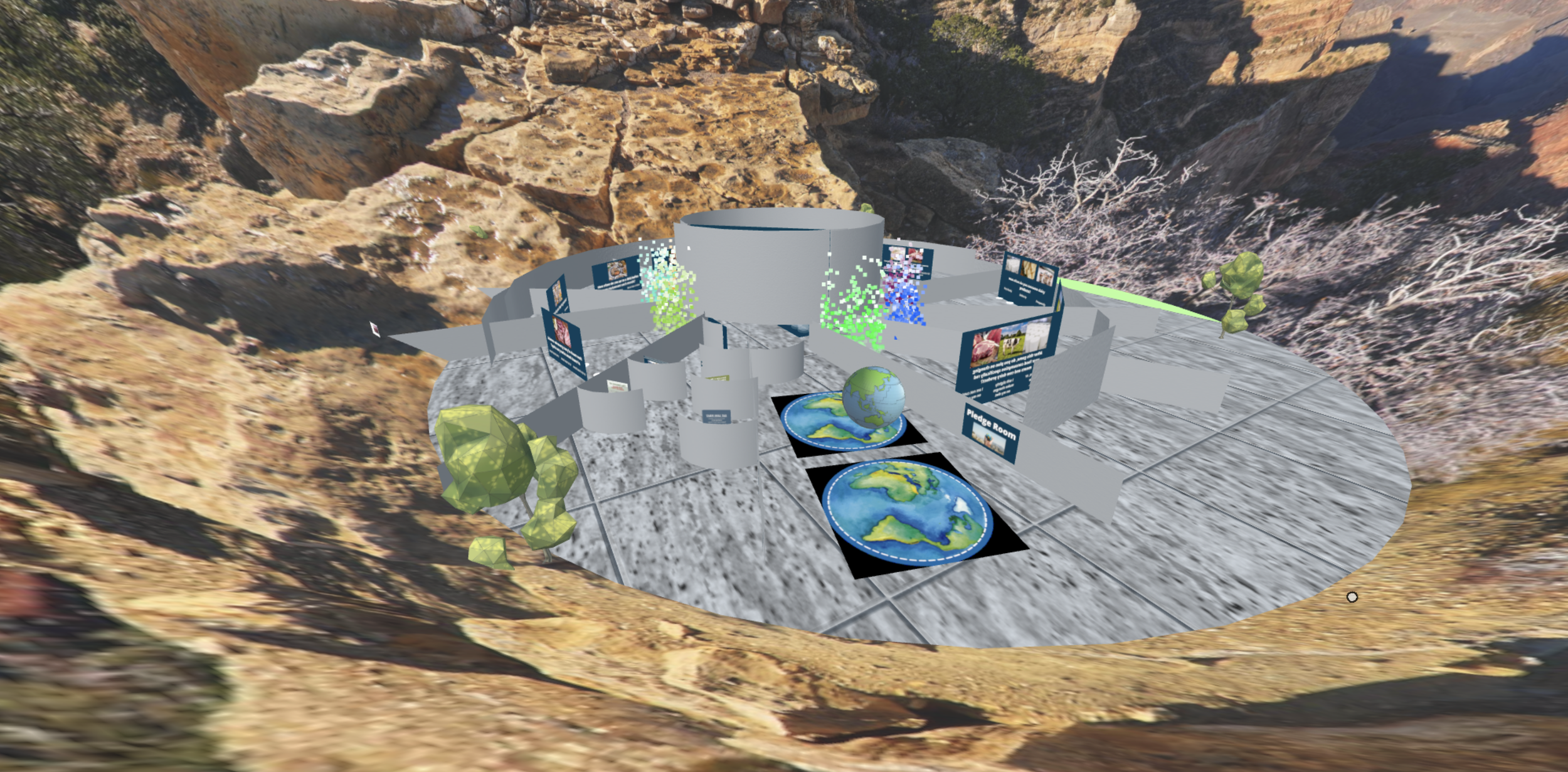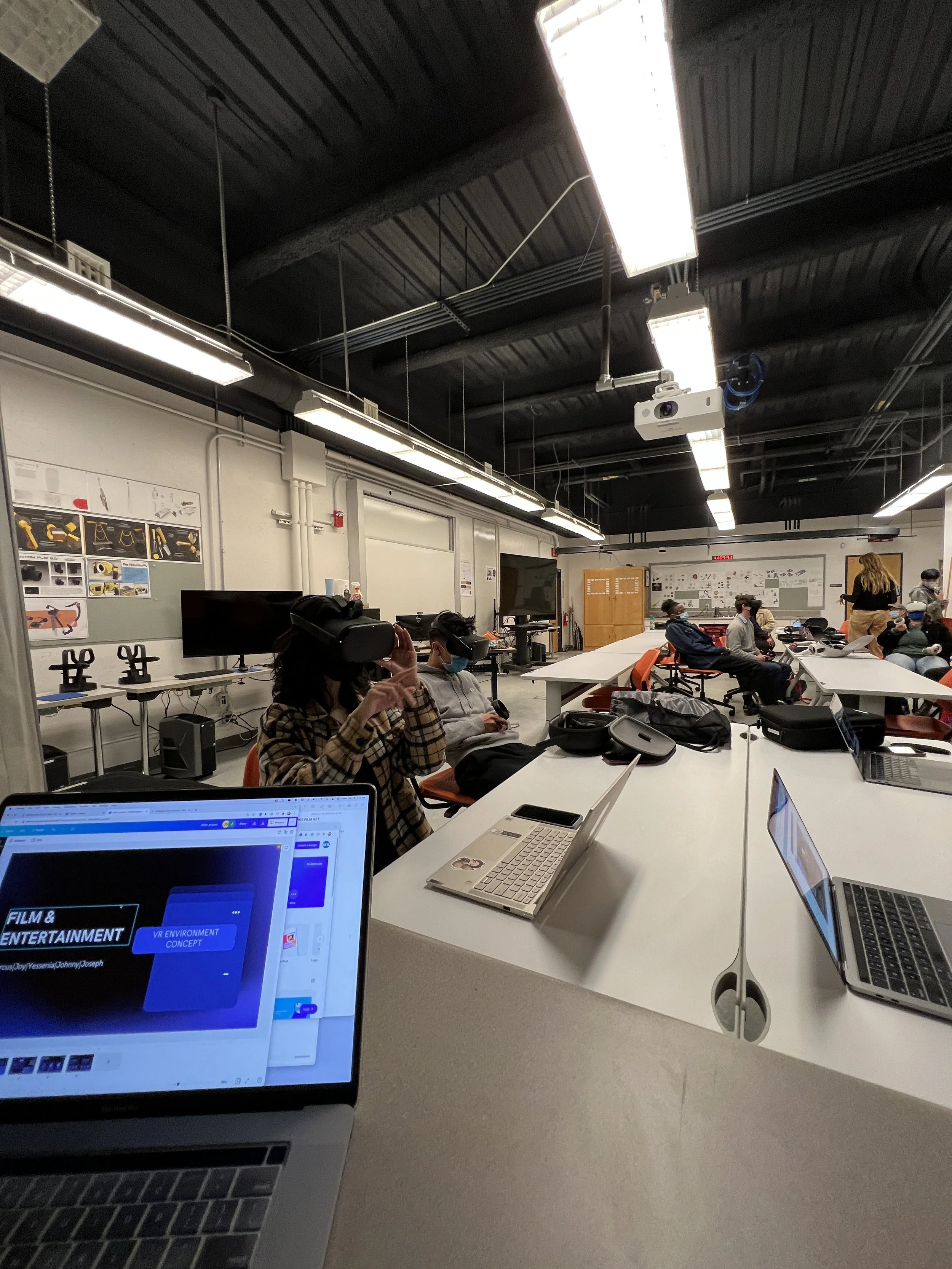
VR PROJECT
Climate Change E-learning Experience
Background of the Project
Virtual spaces are becoming more commercialized. Due to the 2019 Pandemic, collaboration and learning experiences were moved to the remote situation. Our project explores a conceptual climate change learning experience in a virtual environment.
Role
Lead Designer | Prototyper | Researcher
Along with Katie Franke and Jiamin Xu
Tools
Oculus Quest | Adobe CC | Mozilla Spoke
Outcome
Designed a VR space and presented in Interaction Design Class
Duration
3-4 weeks
Design Thinking
O1
Emphatize
User Research
Secondary Research
User Interviews
User Surveys
Affinity Mapping
Project Kick Off
Our team brainstormed topics about climate change. We found that it’s a broad topic to encapsulate, and we had to narrow it down to food production branch impacts. We also tackled user experience with the topic of climate change and how users consume information about the issue,
User research
Through our user interview, we collected transcripts from our 1:1 conversations. We learned that users primarily consume information about the top virtually. However, we also noticed that most users are ignoring the topic. For instance, one of the users founds flashy ads yet ignored reading the topic unless otherwise, someone engage in the conversation of climate change.
Secondary Research
Our team decided to dig deeper into recent data about climate change's impact on Earth. We acknowledge that we cannot encompass all the branches of climate change to be presented in the virtual room; given the time frame of this project, we focused on the area of food production and consumption’s impact. We learned that this topic would be relevant to all users as we consume food, especially meat, in our daily meals.
What are the main concerns with Climate Change?
How do users consume information about climate change?
Are there existing virtual spaces for climate change activism?
How do we interpret design solutions on a virtual space?
How can climate change education become an engaging topic?
Does this project help create awareness and bring a sense of urgency?
O2
Define
User Pain Points
User Problem Statement
User Persona
How Might We?
Hypothesis
User Journey
USER STATEMENT
I often engage with the topic only when it’s brought up in conversation. I am aware of the problem, but not everyone is willing to learn about it so I will just move on with my own life.
How might we?
How might we present climate change ideas that will reinforce social awareness and build an innovative educational platform for people?
Hypothesis
If users can interact better in a gamified experience, they will be able to absorb knowledge better on the climate change crisis.
Education
The topic of Climate Change(CC) is broad in general. Some users are only aware of specific impacts of their day-to-day activity on climate change.
Wayfinding
Bridging users with the topic of CC remains unengaging based on the three participants existing information they source out.
Media
One user did not debate over social media due to different opinions being formed by different commentators.
Awareness
The topic is a critical issue to most users, but it is often neglected due to a lack of awareness of its impact.
Creating Devaugn as User Persona…
PROBLEM STATEMENT
If Devaugn can invite his peers to a learning virtual space, it will help reinforce the Climate Change issues and become knowledgeable about the concerning implications to society.
Planning User Journey when user learns and share climate change on VR media
Targeting the lowest point of the user experience wherein the user felt troubled and confused about the topic. This calls for a design that will create an engaging platform for users to interact with Climate Change topics.
O3
Ideate
Ideation
Prioritize User Insights
Brainstorm
Sketches
Existing Virtual Spaces
Listing some ideas we were thinking of as a possible design solution;
A VR educational environment is similar to museum exhibit rooms.
Each room could be themed with a different topic of climate change, a statue/model of something in the middle of a circular room, with educational wall images surrounding it.
The main model could have a button you press to play an audio information segment.
Trivia games could be incorporated as well.
In this project phase, our team decided to do another brainstorming session collecting all user insights and prioritizing the main user experience when learning about Climate Change.
Define
Concept Sketches
Creating virtual rooms;
In the VR space, we thought a game experience would reinforce an engaging learning experience.
We decided to draft a room and possible game mechanics for user testing.
Due to the limitations of sketches, we narrated that it will be a moderated user experience in the VR environment.
Trivia games will be incorporated, and an after-learning reflection.
O4
Prototype
Mockups
Iteration
Mockups
Individual rooms
Rooms with separate survey questions will determine user impact on climate change. Adding Micro-interactions such as grabbing disc objects to be placed on their cylinder will measure their impact and contribution to Climate Change among user groups.
Informational/ Learning rooms
Users get to be toured around a separate virtual room, providing knowledge about food consumption and production’s impact on climate change.
Pledge rooms
At the end of the tour, users get to reflect on their climate change impact. Providing an engaging place to discuss CC and how they can make a difference after the tour. There’s a moral obligation to protect Mother Earth, which will bring value to helping each other voice out against Climate Change.
O5
Testing
Final Design
Usability testing
Reflection
Final Design
Usability Testing
We facilitated in-person and virtual user testing resulting in great user feedback. The effectiveness of learning and engagement was observed by participating users. The VR space does require more polishing and added visuals. It was observed that most users were unaware of meat consumption’s impact on climate change. Which allowed users to reflect on their change of daily diet.
Reflection
Takeaways
This project allowed us to explore UX in the VR space. I led my team in building the space and facilitating brainstorming sessions. Due to time constraints, we device Mozilla Hubs to rapidly prototype with existing assets and use Adobe CC for visual refinement. The project helped us define UX in different platforms and how we can adapt a human-centered virtual reality space for everyone. I was lucky to be part of design innovations and new ways to interpret User Experience.
If I have more time, I will design more rooms with randomized topics surrounding climate change. Adapt more data and explore other gamified experiences. As a human, we must maintain a livable world, so we can further respond quickly to the growth of Climate change.






















